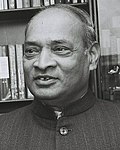This article relies largely or entirely on a single source .(November 2023) |
| ||||||||||||||||||||||||||||
7 seats | ||||||||||||||||||||||||||||
|---|---|---|---|---|---|---|---|---|---|---|---|---|---|---|---|---|---|---|---|---|---|---|---|---|---|---|---|---|
| Turnout | 50.6% [1] | |||||||||||||||||||||||||||
| ||||||||||||||||||||||||||||
 | ||||||||||||||||||||||||||||
| ||||||||||||||||||||||||||||
The 1996 Indian general election in Delhi was held to elect representatives of the 7 seats of the NCT of Delhi in the Lok Sabha.
Contents
- Parties and alliances
- Bharatiya Janata Party
- Indian National Congress
- List of Elected MPs
- References
The Bharatiya Janata Party won 5 of the 7 seats in Delhi, with its opposition, the Indian National Congress winning 2 seats.


